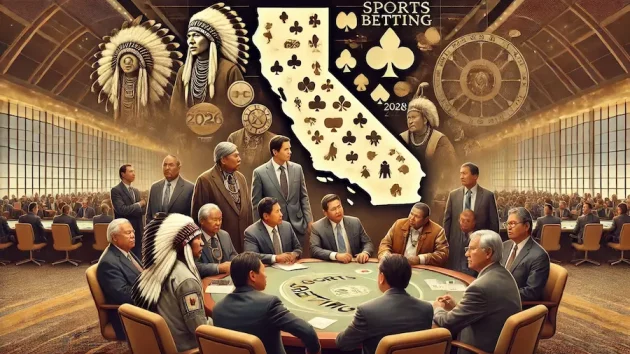California Tribes Decline 2026 Sports Betting Ballot, Look Toward Long-Term Strategy
California tribal leaders confirmed at the ICE convention in Barcelona on Tuesday (21 January) that they will not seek to legalise sports betting in 2026, citing both voter uncertainty and the need for thorough tribal collaboration. Although tribal representatives have made strides toward an agreement, recent polling suggests that now is not the time for another push at the ballot box.

Tribes Urge Caution in Expanding Gaming
James Siva, chairman of the California Nations Indian Gaming Association (CNIGA), addressed attendees during the “State of Gambling in California: Current Trends and Future Prospects” panel. Emphasising a measured approach, Siva stated that tribes have
“come too far and have too far to go to rush into this complex sports betting (issue) which is tied to igaming”.
Siva noted that the desire to ensure legal sports betting stays rooted in Indian Country remains paramount. He was joined on the panel by Catalina Chacon of the Pechanga Band of Mission Indians and Johnny Hernandez of the San Manuel Band of Mission Indians.
The session capped four discussions hosted by the Indian Gaming Association (IGA), covering topics ranging from forging new partnerships in Indian Country to potential growth opportunities for tribal sports betting.
‘It’s Not Going to Happen in 2026’
Among the most significant points raised was the tribes’ collective decision to hold off until at least 2028 for a ballot measure. According to Chacon:
“It’s not going to happen in 2026. The data is telling us that the time is not right. Definitely not 2026, we’re looking more like 2028, but it has to include all tribal communities in California.”
Hernandez concurred, emphasising that any plan to legalise sports betting—or later, online gaming—must work for every tribe, gaming or otherwise:
“It has to include all tribes, including non-gaming tribes. I agree with Catalina that all tribes have to be in agreement. Gaming must go through the tribes.”
Siva reinforced the importance of taking a patient stance:
“We have come too far to rush into this to potentially damage the foundation that we have built,”
“For 2026 we’re being very patient. The outlook is looking toward the future.”
Striving for ‘Ownership’ Instead of Simple ‘Consensus’
Key to any tribal proposal is the notion of “ownership,” an idea Chacon mentioned repeatedly—signaling that every tribe, from large gaming operators to smaller, rural communities, needs a genuine stake in any future sports betting framework.
Many tribes already pool money through the Revenue Sharing Trust Fund (RSTF), established in 1999 to distribute $1.1 million (£891,591/€1.05 million) annually to non-gaming tribes. Should sports betting or online casino gaming become legal, that figure—and the underlying framework—will undoubtedly be revisited.
While “consensus” was the buzzword in previous years, tribal leaders at ICE spoke more about comprehensive “ownership” of the process, indicating broad-based agreement is crucial before bringing any measure back to voters.
Sweepstakes Operators under Scrutiny
Another dominant theme was the rise of unregulated sweepstakes in California, which some see as exerting pressure on tribal gaming interests. Chacon pointed out the issues with these online offerings, saying:
“They are getting away with it by saying that it’s a non-play, that there is no money,”
“But if you peel back, you see that there is. It’s not OK. It’s illegal in California. Sweepstakes casinos are just not what they say they are.”
Hernandez agreed, viewing sweepstakes as an infringement on tribal sovereignty:
“It is a violation of both our exclusivity and infringing on our sovereignty,”
According to panel members, sweepstakes companies’ aggressive advertising highlights the necessity of a lawful, regulated approach—though the tribes remain adamant that any eventual sports betting expansion belongs first and foremost to Indian Country.